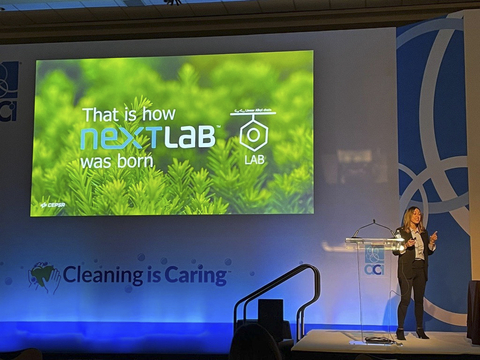NextLab-R: A Sustainable Revolution in the Detergency Sector
The chemical industry has been researching how to improve sustainability in the detergency sector for many decades. Cepsa Química, the world's leading producer of linear alkylbenzene (LAB), has succeeded in developing and producing the world's first sustainable LAB from renewable raw materials, the so-called NextLab-R.
This press release features multimedia. View the full release here: https://www.businesswire.com/news/home/20230201005036/en/

Virginia Sanchez, Marketing Manager for Home Care, Cepsa Quimica (Photo: Business Wire)
NextLab-R, part of the new family of sustainable products called NextLab, is the world's first LAB made from renewable material. It keeps the same outstanding performance as its fossil counterpart but has a lower carbon footprint, being therefore, a more environmentally friendly product. NextLab-R is available in two categories, depending on its content in sustainable material, NextLab-R68 and NextLab-R100.
Reducing GHG emissions
NextLab R-68, the first product launched as part of the NextLab Platform strategy, has an estimation to achieve between 25 to 35% of CO2 reduction emissions on a cradle to gate analysis when compared to fossil PETRELAB, according to the preliminary results of the Life Cycle Assessment that is underway.
The development of the world's first sustainable LAB by Cepsa Química responds to the need of today's detergency industry to create more environmental friendly products, while preserving their efficiency and offering maximum washing effectiveness.
NextLab-R makes it possible to significantly improve products’ sustainability without having to change their formulation. According to preliminary estimations, the reduction on the GHG emission on a final detergent formulation could be up to 10%, by using NextLab-R in their compositions.
The Spark for the Transformation: Mass Balance approach
NextLab-R incorporates renewable raw materials, being the first sustainable LAB worldwide and enables Cepsa Química's customers to improve the sustainability of their products.
Cepsa Química is launching its NextLab – R68, based on mass balance.
Mass Balance is used as a Chain of Custody method, allowing to blend and co-process fossil raw materials with sustainable ones and tracking them throughout the entire production process while recorded in an auditable bookkeeping.
This is the spark for the sustainable transformation that the industry is looking for. The mass balance allows that the current production process utilized to produce fossil LAB can be used, safely, with renewable and circular raw materials.
This process is the beginning of a whole industrial transformation towards segregated products but brings a whole new perspective into the sustainable solutions that are possible for the World right now.
From the total surfactants employed in the formulation of household detergents, LAS represents more than 60%. Its excellent properties, its efficacy, as well as its processability and compatibility with other ingredients, make it a very useful element in the washing process, both in traditional formats (powder or bar detergent) and in more sophisticated products (single-dose capsules or highly concentrated liquid detergents).
With this market size, it was imperative that Cepsa Química would start the transformation in the market and bring sustainable solutions that are already available at commercial scale.
The manufacturing process of NextLab-R is verified by the ISCC PLUS certification scheme, which guarantees sustainability in the production process from the origin of the raw materials to the delivery of the final products, using the material balance methodology.
The most modern technology is used in its production, based on the new Detal Flex 2-Phenyl, the cleanest and most advanced process for LAB production, available only in Cepsa Química's plants and which saves more than 80,000 cubic meters of water and reduces 1,100 tonnes of waste per year for a higher quality product.
Cepsa Química wants to keep its leadership positioning, with the highest level of service and commitment with the market, and also as one of the topmost sustainable companies in the world.
Cepsa is a leading international company committed to sustainable mobility and energy with a solid technical experience after more than 90 years of activity. The company also has a world-leading chemicals business with increasingly sustainable operations. In 2022, Cepsa presented its new strategic plan for 2030, Positive Motion, which projects its ambition to be a leader in sustainable mobility, biofuels, and green hydrogen in Spain and Portugal, and to become a benchmark in the energy transition. The company places customers at the heart of its business and will work with them to help them advance their decarbonization objectives. ESG criteria inspire everything Cepsa does as it advances toward its Net Positive objective. This decade, it will reduce its Scope 1 and 2 CO2 emissions by 55% and the carbon intensity index of its energy products sales, which includes Scope 1, 2 & 3 by 15-20%, with the goal of reaching net zero emissions by 2050.
Cepsa Química is a world leader in its sector and is leading the shift towards sustainable chemistry, with a clear commitment to the fight against climate change and the transition to a circular, non-fossil economy. The company leads the worldwide production of LAB, the primary raw material used in biodegradable detergents, where Cepsa Química is a pioneer player. It is also number one in the production of cumene, an intermediate product used in the production of phenol and acetone, which are the primary raw materials for the manufacture of engineering plastics and of which it is the world’s second-largest producer.
Cepsa Química currently employs more than 1,000 people and has plants in seven countries world worldwide (Spain, Germany, Brazil, Canada, China, Indonesia, and Nigeria).
View source version on businesswire.com: https://www.businesswire.com/news/home/20230201005036/en/



